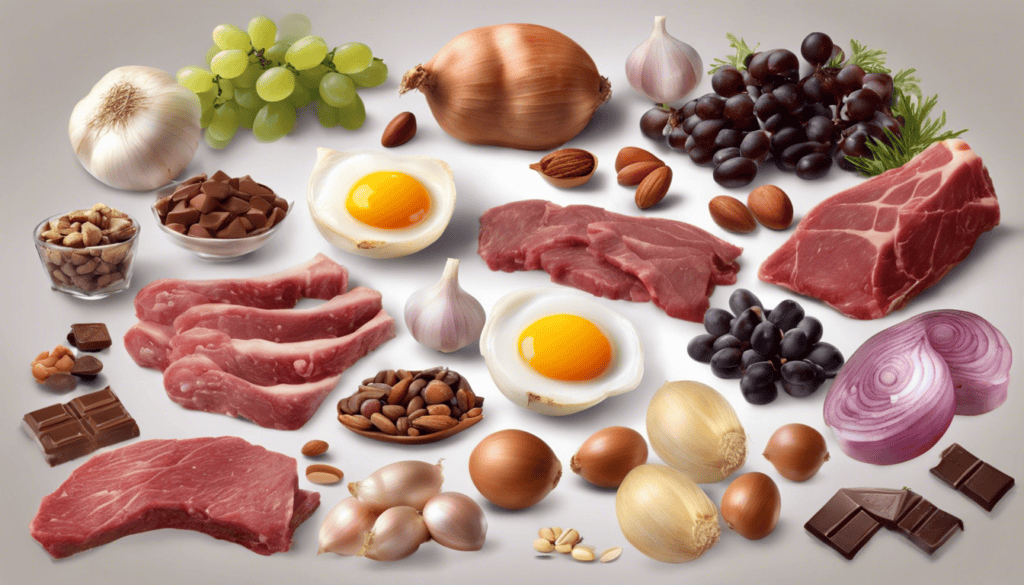We all love to treat our furry companions with tasty snacks once in a while. And what better way to spoil them than with nature’s sweet bounty – fruits! But before you start filling up their food bowls with an assortment of colorful fruits, it’s important to know which ones are safe for your feline friends.
Cats have different dietary requirements compared to us humans, so not all fruits are cat-friendly. However, there are several fruits that are not only safe but can also provide some amazing health benefits for our feline friends.
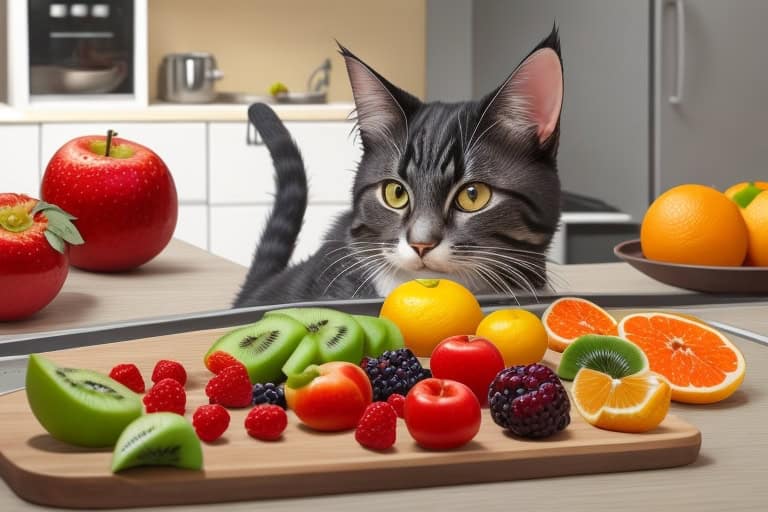
From juicy mangoes and succulent strawberries to crunchy apples and creamy bananas, the world of desirable fruits for cats is broad and enticing.
So, let’s delve into the delicious world of fruits and find out what fruits cats can enjoy without any worries!
Key Insights
| Fruit | Benefits and Notes |
|---|---|
| Mangoes | Cats can safely enjoy small amounts of mangoes packed with vitamins A and C. |
| Strawberries | Another cat-friendly fruit that can provide a boost of antioxidants and fiber. |
| Apples | Sliced into bite-sized pieces without seeds or core, apples can be a tasty treat for cats. |
| Bananas | Delicious and offer potassium and vitamin B6 to support your cat’s overall health. |
| Blueberries | A superfood for both humans and cats, containing antioxidants that promote brain health. |
| Watermelon | A hydrating fruit that cats can enjoy in moderation, providing essential hydration on hot summer days. |
Can Cats Eat Mango?
Mangoes are delicious tropical fruits that are loved by many humans. And if you’re a cat owner, you might be wondering if it’s safe for your feline friend to indulge in this juicy fruit as well. Well, the good news is that mangoes are generally safe for cats to eat!
Mangoes are packed with essential vitamins and nutrients like vitamin C, vitamin A, and fiber. These nutrients can contribute to your cat’s overall health and wellbeing. However, it’s important to note that moderation is key when it comes to feeding mangoes to your cat.
Too much of this sweet treat can potentially upset their stomach and cause digestive issues. So, it’s best to offer small, occasional pieces as a special treat for your furry companion.
Cats may also enjoy the taste of mangoes due to their natural curiosity and love for exploring new flavors. Just make sure to remove the pit and skin before sharing this fruit with your cat, as they can be choking hazards.
Do also keep an eye out for any signs of allergic reactions or discomfort after introducing mangoes into your cat’s diet.
Remember, while mangoes can be a tasty and nutritious addition to their diet, it’s always recommended to consult with your veterinarian before making any changes to your cat’s regular meal plan.
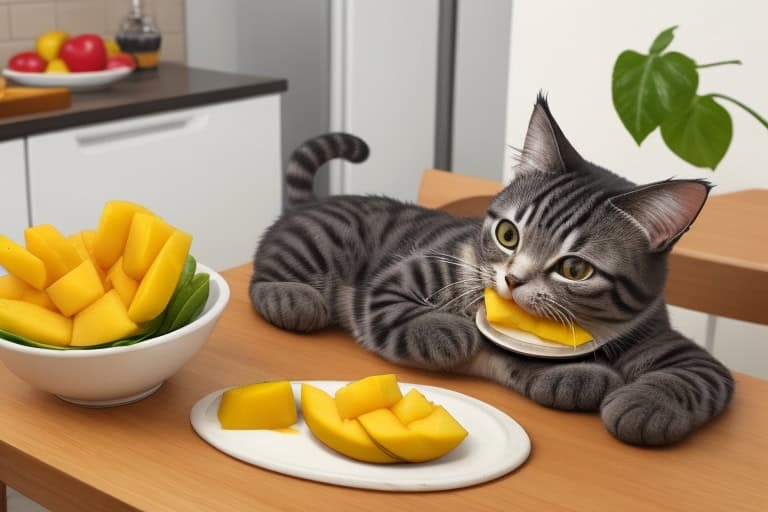
| Advisory Information |
|---|
| Mangoes are generally safe for cats to eat in moderation |
| They are packed with essential vitamins and nutrients like vitamin C, vitamin A, and fiber |
| Moderation is key to avoid stomach upset and digestive issues |
| Remove the pit and skin before sharing mangoes with your cat to prevent choking hazards |
| Watch out for any signs of allergic reactions or discomfort after introducing mangoes |
| Consult with a veterinarian before making any changes to your cat’s regular meal plan |
Can Cats Eat Strawberries?
Strawberries are a vibrant and juicy fruit that not only entices our taste buds but also adds a burst of color to desserts and snacks. And you might find yourself wondering, can cats enjoy this delightful fruit as well?
Well, the good news is that cats can indeed eat strawberries! However, it’s important to keep in mind a few things before sharing this fruity treat with your feline friend.
First and foremost, moderation is key. While strawberries are generally safe for cats to consume, they should only be given in small quantities as an occasional treat. Too many strawberries can lead to an upset stomach or digestive issues for your furry companion.
Additionally, it’s crucial to remove the green leafy tops of the strawberries before offering them to your cat. These tops can pose a choking hazard and are best avoided.
So, next time you’re indulging in a bowl of freshly picked strawberries, feel free to share a tiny piece with your feline companion, and watch their excitement unfold!
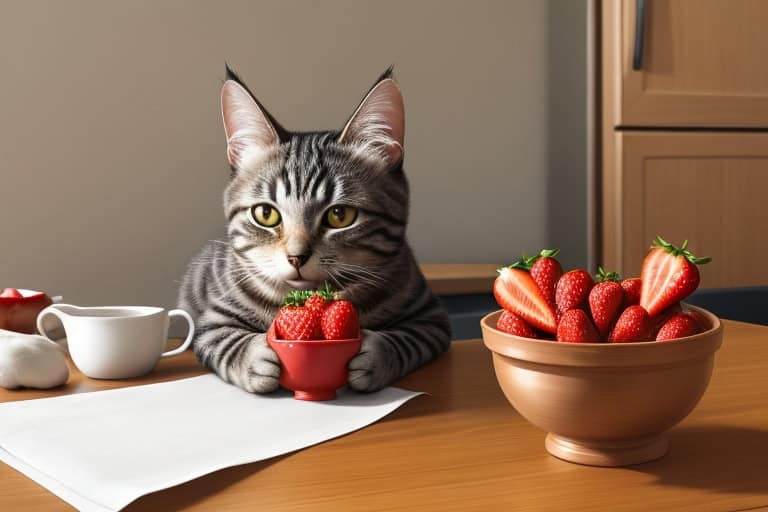
| Advisory Information |
|---|
| Cats can eat strawberries in moderation as an occasional treat. |
| Too many strawberries can cause digestive issues for cats, so it’s important to limit the quantity. |
| The green leafy tops of strawberries should be removed before giving them to your cat to avoid choking hazards. |
| Sharing a small piece of strawberry with your feline friend can bring joy and excitement to their day. |
Can Cats Eat Apple?
Apples, those crispy and juicy fruits that make our taste buds dance in delight! But can our feline friends indulge in the sheer joy of biting into an apple? It turns out that apples can actually be a tasty and nutritious treat for our cats.
Apples are packed with essential nutrients like vitamins A and C, as well as dietary fiber. These nutrients contribute to a healthy immune system and digestion. However, it’s crucial to take some precautions.
Make sure to always remove the apple seeds and core, as they contain traces of cyanide, which can be harmful to cats. Additionally, it’s essential to cut the apple into small, manageable pieces to prevent choking hazards.
So go ahead and offer your cat a small slice of apple as a reward, and witness the excitement in their eyes as they savor this sweet and refreshing treat.
Remember, moderation is key. While apples are safe for cats, they should be given in moderation as an occasional treat.
Too much of anything, even something as seemingly harmless as an apple, can upset their delicate stomachs. Always consult with your veterinarian if you have any concerns or questions regarding your cat’s diet.
So grab an apple, slice it up, and watch your feline friend experience a burst of excitement over this delightful new treat!
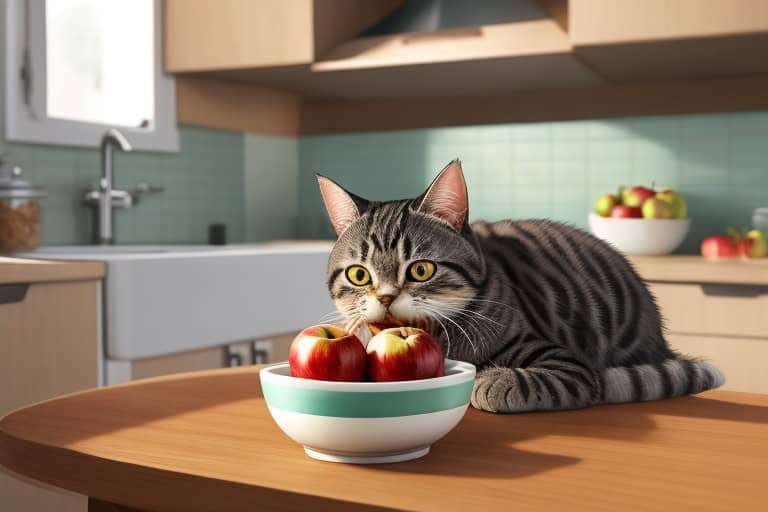
| Advisory Information |
|---|
| Apples are packed with essential nutrients like vitamins A and C, as well as dietary fiber. |
| These nutrients contribute to a healthy immune system and digestion in cats. |
| Remove the apple seeds and core, as they contain traces of cyanide which can be harmful to cats. |
| Cut the apple into small, manageable pieces to prevent choking hazards. |
| Offer your cat a small slice of apple as a reward and witness the excitement in their eyes. |
| Remember to give apples in moderation as an occasional treat for your cat’s delicate stomach. |
| Always consult with your veterinarian if you have any concerns or questions about your cat’s diet. |
Can Cats Eat Bananas?
Bananas are a delicious and popular fruit that many humans enjoy on a daily basis. But what about our feline friends?
Can cats eat bananas? Well, the good news is that bananas are generally safe for cats to consume in small amounts.
Bananas are packed with essential nutrients like potassium, vitamin C, and vitamin B6, which can be beneficial for cats. These nutrients can contribute to their overall health and well-being.
However, it’s important to note that bananas should be given to cats as an occasional treat and not as a regular part of their diet. Overfeeding bananas to cats can lead to digestive issues and potential weight gain. So, if you’re thinking of sharing a small piece of banana with your kitty, go ahead and watch their excitement as they enjoy this tasty treat!
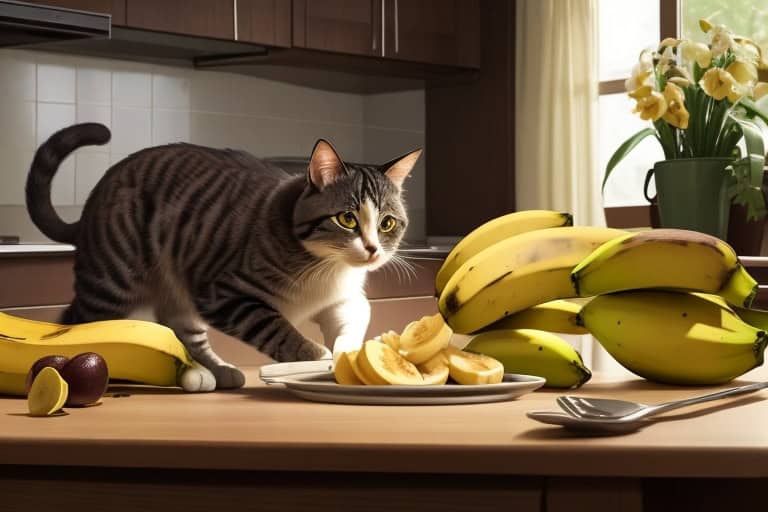
| Advisory Information |
|---|
| Bananas are generally safe for cats to consume in small amounts. |
| Bananas contain essential nutrients like potassium, vitamin C, and vitamin B6 that can benefit cats’ health. |
| It’s important to give bananas as an occasional treat rather than a regular part of their diet. |
| Overfeeding bananas can cause digestive issues and potential weight gain in cats. |
Can Cats Eat Pears?
Pears are a juicy and refreshing fruit that many humans enjoy. But what about our feline friends? Can cats eat pears? The answer is yes, they can!
Pears are actually a safe and healthy treat for cats to enjoy in moderation.
Packed with vital nutrients like vitamins C and K, as well as fiber, pears can provide a tasty and beneficial addition to a cat’s diet. The soft and sweet flesh of pears can be a delightful change of pace for our furry companions.
However, it’s important to note that just like with any new food, introducing pears to your cat’s diet should be done gradually to ensure they tolerate it well.
Additionally, always make sure to remove the skin and seeds, as they can be difficult for cats to digest and may pose a choking hazard.
So, if you’re looking to treat your kitty to a fruity delight, offering a small and carefully prepared piece of pear can be a wonderful way to share your love and excitement with your feline friend.
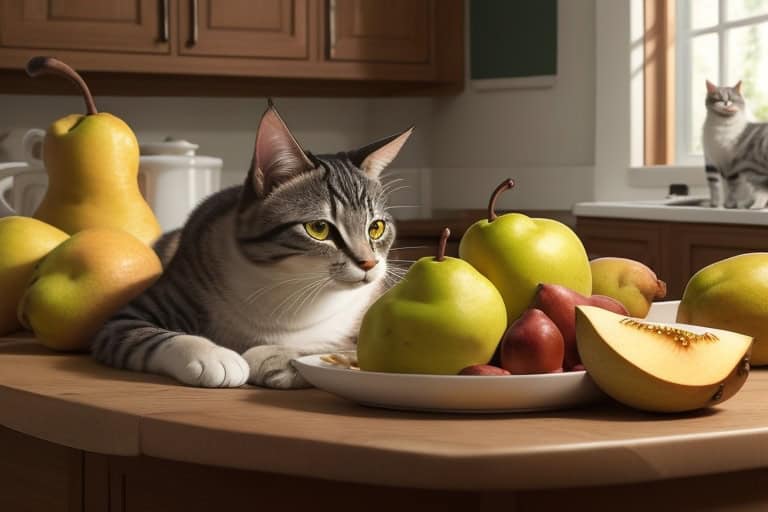
| Advisory Information |
|---|
| Pears are a safe and healthy treat for cats to enjoy in moderation. |
| Packed with vital nutrients like vitamins C and K, as well as fiber. |
| The soft and sweet flesh of pears can be a delightful change of pace for cats. |
| Introduce pears to your cat’s diet gradually to ensure they tolerate it well. |
| Always remove the skin and seeds before giving pears to your cat. |
| Skin and seeds can be difficult for cats to digest and may pose a choking hazard. |
Can Cats Eat Blackberries?
Blackberries are not only delicious for humans, but they can also be an exciting treat for our feline friends.
These juicy berries are packed with essential nutrients like vitamins C and K, as well as dietary fiber. While cats are primarily carnivores, a few bites of blackberries can be a healthy addition to their diet.
However, before you let your cat indulge in this fruity delight, there are a couple of things to consider. Always remember to wash the blackberries thoroughly to remove any harmful pesticides or chemicals.
Additionally, remember that moderation is key. Too many blackberries can lead to an upset stomach or diarrhea in cats. So, keep the portion small and remember to introduce any new food gradually into their diet to avoid any gastrointestinal issues.
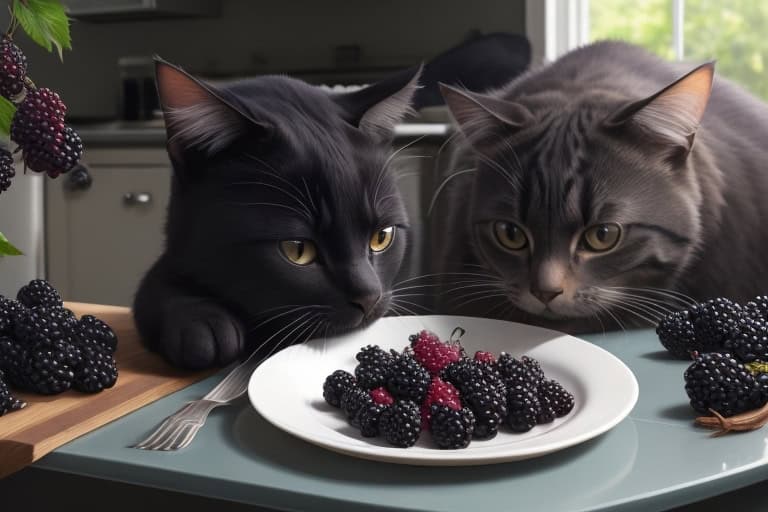
| Advisory Information |
|---|
| Blackberries are a delicious and nutritious treat for cats. |
| They contain essential nutrients like vitamins C and K, as well as dietary fiber. |
| Cats should only have a few bites of blackberries to maintain a balanced diet. |
| Wash the blackberries thoroughly to remove any harmful pesticides or chemicals before feeding them to your cat. |
| Moderation is key – too many blackberries can cause an upset stomach or diarrhea in cats. |
| Introduce new foods gradually into your cat’s diet to avoid gastrointestinal issues. |
Can Cats Eat Oranges?
Oranges, with their vibrant color and citrusy aroma, are a favorite treat for many humans. But what about our feline friends? Can cats enjoy the tangy goodness of oranges too?
While cats are obligate carnivores and their dietary needs primarily consist of meat, they can occasionally have a small taste of oranges. However, it is important to remember that oranges should only be given to cats in moderation.
One of the reasons cats can have a small amount of oranges is because these citrus fruits are packed with essential vitamins, such as vitamin C. This nutrient can support a cat’s immune system and contribute to their overall health.
However, it’s crucial to note that oranges should never replace a cat’s regular balanced diet of protein-rich cat food. Feeding them too many oranges can lead to digestive upset, including diarrhea or vomiting.
Additionally, the high sugar content in oranges can potentially contribute to weight gain or even diabetes in cats.
As responsible pet owners, it’s our duty to ensure we provide our furry companions with a balanced and appropriate diet that meets their specific nutritional needs.
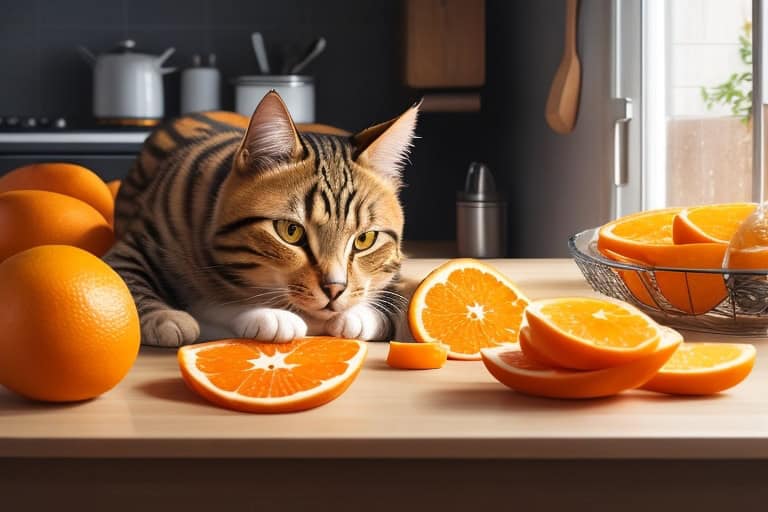
| Advisory Information |
|---|
| Oranges can provide cats with essential vitamins, such as vitamin C, supporting their immune system and overall health. |
| Oranges should only be given to cats in moderation and should never replace their regular balanced diet of protein-rich cat food. |
| Feeding cats too many oranges can lead to digestive upset, including diarrhea or vomiting. |
| The high sugar content in oranges can potentially contribute to weight gain or even diabetes in cats. |
| As responsible pet owners, it’s important to provide our furry companions with a balanced and appropriate diet that meets their specific nutritional needs. |
Can Cats Eat Rambutan?
Rambutan, a tropical fruit native to Southeast Asia, is a delightful treat for us humans.
Its vibrant red skin and unique hairy appearance make it truly intriguing. But is it safe for our feline friends to indulge in this exotic fruit?
As much as we may be excited about sharing our favorite snacks with our beloved cats, it is important to prioritize their health and well-being.
While rambutan may be tempting to offer to our curious kitties, it is essential to exercise caution. Cats have different dietary needs than humans, and not all fruits are suitable for them.
Rambutan contains high sugar content, which can potentially disrupt a cat’s delicate digestive system and lead to undesirable health issues. Moreover, the large seed at the center might pose a choking hazard, making it important to remove it before considering sharing any rambutan flesh with them.
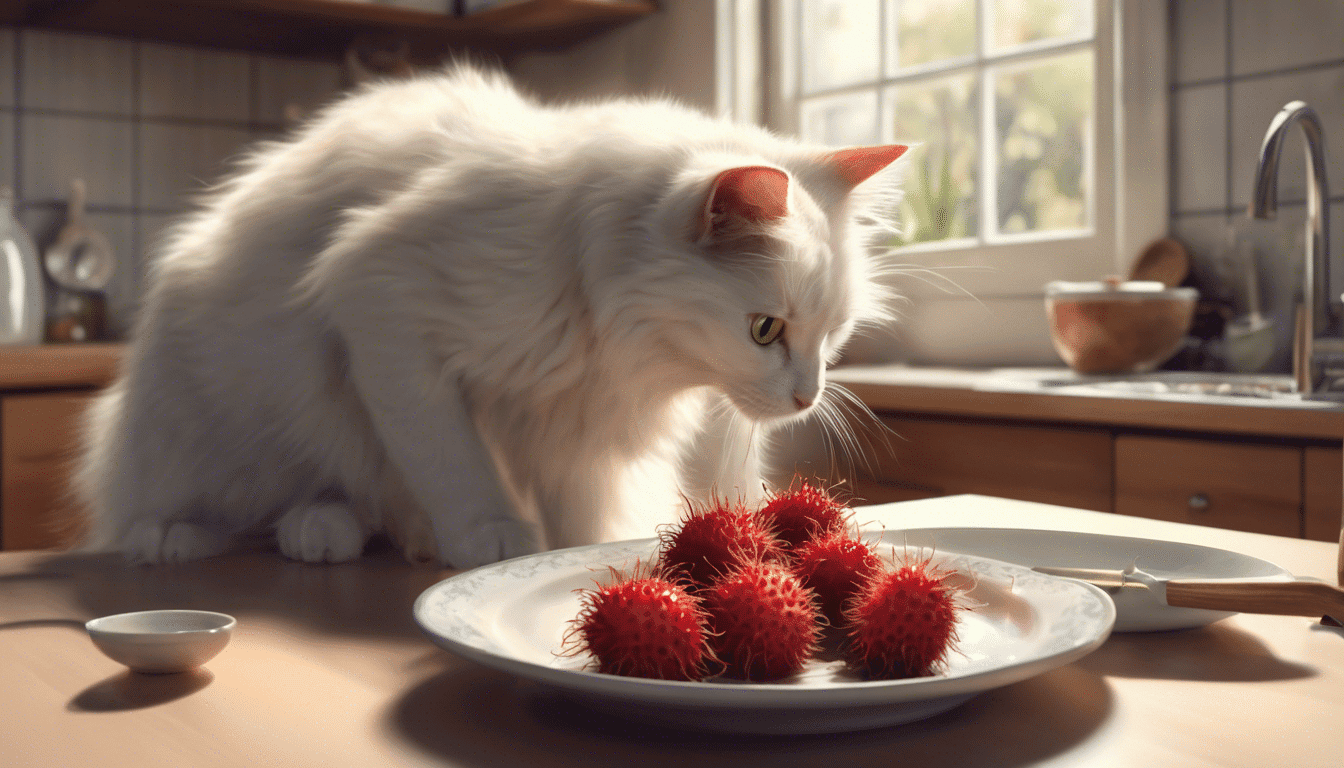
| Advisory Information |
|---|
| Cats have different dietary needs than humans, and not all fruits are suitable for them. |
| Rambutan contains high sugar content, potentially disrupting a cat’s delicate digestive system. |
| The large seed at the center of rambutan might pose a choking hazard for cats. |
| It is important to remove the seed before sharing any rambutan flesh with cats. |
While cats can enjoy a variety of fruits like mango, strawberries, apples, bananas, pears, and blackberries, it’s important to remember to remove any harmful parts, such as seeds, cores or citrus peels. Always offer fruits in moderation and consult with a veterinarian if you have any concerns or questions about your cat’s diet.

In her previous life, Lisa traveled extensively, both for work and leisure. After the pandemic struck, Lisa locked up her luggage and adopted a cat ever since.
Lisa is now an avid cat lover, she devotes most of her free time serving as butler to her adorable feline at home. When she is not with her cat, she can be seen using her phone sourcing for the latest cat supplies online.

